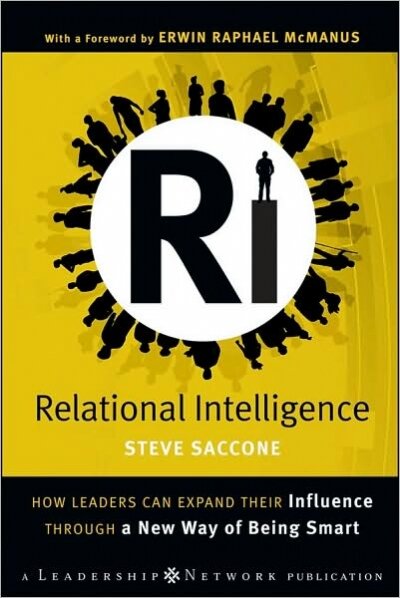Steve Saccone, Relational Intelligence: How Leaders Can Expand Their Influence Through a New Way of Being Smart. Jossey-Bass / Leadership Network, 2009.
Referenced in:
- Communication, Healthy Behavior, Forgiveness
- Leadership Development Through Communication Competence
LifeandLeadership.com Summary
The fact that this resource was produced by Leadership Network attests to its quality. It also comes highly recommended by Erwin Raphael McManus the leader and “social architect” of the Mosaic faith community in Los Angeles.
It is not so much a book on skills-building, but on explaining the importance of relational intelligence (RI) as a leadership currency in the “human economy,” and as the title suggests, how it helps church leaders “expand their influence.” Saccone calls RI a new kind of intelligence, just like intellectual intelligence or emotional intelligence. He says:
“It never ceases to amaze me how a meaningful relationship can open a person’s heart to new spiritual realities never thought possible.”
“Relational Intelligence strives to guide leaders in reprioritizing their emphasis on the quality in their relationships, and in doing so expand their ability to influence others more effectively.” (5)
“In the past, authority and credibility were built on status, power, or position, but in today’s world it’s built on power and trust. To be relationally intelligent, we must shift from a positional authority mind-set to the crucial mind-set of relational authority.” (10)
Saccone discusses six roles/skills of leaders who have RI.
1. The Story Collector — The skill of becoming genuinely interested in the story that other people’s lives are telling, and engaging that story with anticipation. Story collectors know how to discover the most distinct dimensions of another human being through drawing out what is most interesting about them in a smart and meaningful way.
2. The Energy Carrier — The ability to set the tone or “outer energy” of a room or relational context, beginning with managing one’s own internal world and thus be undistracted and fully present in the moment. This allows them to shape and form the relational ethos of the lives of others around them in a positive, meaningful, and intentional way.
3. The Compelling Relator — The capacity to get people interested in a subject, goal, or project. Many of us have an extraordinarily important mission to accomplish, but our failure to become more interesting people, or more “compelling relators,” robs us of our greatest impact.
4. The Conversational Futurist — The ability to use conversation to create change. A good conversationalist can understand the dynamics happening in the present moment, but a brilliant conversationalist sees where a conversation is going and knows how to lead someone into the future they see with intention and speed.
5. The Likeable Hero — The skill of establishing authentic connections that make people feel valued. If likeability is seen in its proportionate value, it will enhance the quality and speed of how your mission gets accomplished.
6. The Disproportionate Investor — The choice to invest time and resources in a few carefully chosen relationships. Relationally intelligent people minimize potentially wasted investments in people and maximize their potentially greatest investments without devaluing anyone in the process. They live by the conviction that it’s better to invest in a few who will reinvest in others than to invest in many who may never reinvest in anyone.
This is excellent book functions as a strong apologetic for relational intelligence, and alongside the discussion guide and other tools available online, is an excellent developmental tool.
From the Publisher
Relational Intelligence (RI) reminds us that the way we choose to relate to one another determines the quality of our human experience and reveals what we value most. If we took a panoramic view of humanity, we’d discover that human relationships unfortunately are often reduced to a commodity, as if people were buying, selling, and trading relationships for personal benefit. This book challenges leaders to no longer see people as a means to an end but to approach people with relational intelligence.
In this book, thought leader, relational intelligence practitioner, and professor Steve Saccone defines the six roles of a relational genius and why they’re essential for the relationally intelligent leader. These life-changing principles can be applied both to church leadership and any other leadership context.
While many leaders want to be relationally intelligent, they struggle to understand what it means and how to implement it. Saccone defines RI in a clear and provocative way: “Relational” in RI means learning to see people as the highest value and conveying that to them. The “Intelligent” part of RI means learning effective interpersonal skills and then applying them in ways that expand influence.
Many leaders long to be influential and missional but, mistakenly, this pursuit is often at the cost of valuing people. When leaders get the relational part right (loving well), and combine it with the intelligence part (applying effective interpersonal skills), their impact will be far-reaching, and even immeasurable.
As a result of becoming relationally intelligent, the world will become not only a smarter place, but a more human one. This is the world Jesus envisions, where love and mission intersect—a world that can only become a reality if we begin to live—and lead with—this new way of being smart.
About the Author
Steve Saccone serves as a catalyst at Mosaic, a community of faith in Los Angeles. His roles include campus pastor and director of Protégé (a two-year global leadership development program). In addition, Steve works as a faith field advisor for The Gallup Organization, speaker, consultant for Monvee, and professor for Golden Gate Seminary. He has an M.A. in Transformational Leadership and lives in Los Angeles with his wife, Cheri, and son, Hudson.
***For additional information on this resource, including reviews, click the bookstore links. Check the reference at page top or the links below for resource guides on related topics.***
Related Areas
See Other Resources on Leadership Development:
See Resources on Over 100 Ministry Topics:


